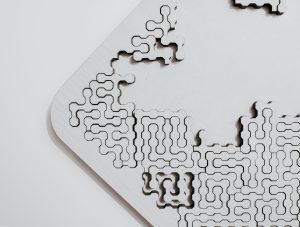Jigsaw puzzles have long been a source of entertainment and mental stimulation, but their benefits go far beyond simple amusement.
For centuries, people have turned to puzzles as a way to challenge their minds, relax, and even connect with others.
Recent studies and expert opinions highlight the many therapeutic advantages of solving jigsaw puzzles, making them a powerful tool for improving mental health, cognitive abilities, and overall well-being.
Whether you’re piecing together an intricate design or solving a relaxing image, the benefits of jigsaw puzzles are vast and provide lasting effects for people of all ages.
Cognitive Benefits: Boosting Brainpower
One of the most intriguing advantages of jigsaw puzzles is their reported ability to enhance cognitive function.
When solving a puzzle, multiple brain processes are engaged simultaneously, from visual perception to problem-solving and memory recall.
With a long-term habit of solving jigsaws, this multi-faceted stimulation plays an essential role in maintaining brain health and enhancing various cognitive functions.
- Improved Memory: Jigsaw puzzles stimulate short-term memory by requiring individuals to recall shapes, colors, and patterns to find matching pieces. This process strengthens neural connections, which can help in reducing memory loss and could even slow the progression of cognitive decline.
- Enhanced Problem-Solving Skills: Puzzles require logical thinking, strategic planning, and adaptability, all of which are valuable cognitive skills that apply to everyday life. By overcoming challenges and solving problems step by step, puzzle enthusiasts develop critical thinking strategies that carry over into other areas.
- Spatial Reasoning Development: Assembling a puzzle helps improve spatial awareness, which is particularly beneficial for children in their developmental years and adults who want to maintain sharp cognitive function.
- Increased Attention to Detail: Working on a puzzle hones the ability to notice small differences in color, pattern, and shape, a skill that can transfer to other aspects of life such as reading, organization, and even career-related tasks. It encourages an eye for detail, which is essential in both everyday and professional settings.
Mental Health Benefits: Reducing Stress and Anxiety
Beyond cognitive improvements, jigsaw puzzles have a profound impact on mental health. The repetitive and focused nature of puzzle-solving can create a meditative state, reducing stress and anxiety levels.
For many, solving a puzzle is an effective way to disconnect from the hustle of daily life and find peace.
- Encourages Mindfulness: Engaging in a puzzle requires concentration, drawing attention away from worries and distractions, much like meditation. By focusing entirely on the puzzle, the mind is diverted from anxious thoughts and emotional stress.
- Lowers Stress Hormones: Research suggests that solving puzzles can lower stress by taking your mind off other matters and letting you relax on your own or in a social setting.
- Provides a Sense of Accomplishment: Completing a puzzle, whether simple or complex, releases dopamine, a neurotransmitter associated with pleasure and motivation, reinforcing positive emotions.
- Improves Emotional Regulation: Focusing on solving a puzzle can provide a structured and calming activity, which can be especially beneficial for individuals dealing with emotional distress or difficulty managing their emotions. Puzzles provide a safe and therapeutic outlet for managing negative feelings and stress.
Social Benefits: Strengthening Relationships
While puzzles can be a solitary activity, they also serve as an excellent way to foster social interaction.
Working on a puzzle with friends, family, or colleagues can strengthen relationships and encourage teamwork. The shared experience of completing a puzzle can create bonds and promote collaboration.
- Family Bonding: Jigsaw puzzles provide a screen-free activity that brings people together, promoting conversation and cooperation. Spending time working on puzzles together is a great way to share quality time and engage with family members.
- Teamwork and Collaboration: In educational and professional settings, puzzles can be used as team-building exercises that require communication and collective problem-solving. Collaborative puzzling fosters a sense of unity and helps develop interpersonal communication skills.
- Intergenerational Connection: Grandparents and grandchildren, or people of different generations, can connect over a shared puzzle, creating lasting memories.
- Community Engagement: Puzzle clubs and online communities allow enthusiasts to share their passion, exchange strategies, and even collaborate on virtual puzzle challenges.
Emotional Benefits: Building Patience and Resilience
Solving puzzles requires patience and perseverance, both of which are valuable life skills.
Unlike fast-paced digital entertainment, puzzles teach individuals to slow down, focus, and enjoy the process rather than rushing to the finish line.
- Developing Patience: Puzzles help individuals practice delayed gratification by encouraging a step-by-step approach to solving problems.
- Building Resilience: Facing and overcoming challenges while solving a puzzle fosters a mindset of persistence, which can be applied to real-life obstacles.
- Boosting Self-Confidence: Completing a puzzle, especially a difficult one, instills a sense of pride and self-worth.
- Encouraging Creative Thinking: While puzzles follow a logical path, they also promote creativity by challenging individuals to think outside the box and approach problems from different angles.
Therapeutic Applications of Jigsaw Puzzles
Jigsaw puzzles are increasingly recognized for their potential therapeutic applications across various domains, including cognitive enhancement, occupational therapy, mental well-being, and educational therapy.
While research in this area is ongoing, more therapists, educators, and healthcare providers are exploring the benefits of jigsaw puzzles, as such, their role in holistic well-being continues to expand.
The Role of Jigsaw Puzzles in a Digital World
In an era dominated by screens and instant gratification, the timeless appeal of jigsaw puzzles remains strong.
While traditional puzzles continue to be popular, digital puzzle apps and online games have also emerged, providing accessible ways to enjoy the benefits of puzzle-solving anytime, anywhere.
- Traditional vs. Digital Puzzles: While physical puzzles offer tactile satisfaction and a break from screens, digital puzzles provide convenience and customization.
- Puzzle-Based Mental Wellness: Some mental wellness apps have incorporated jigsaw puzzles into their platforms as a form of guided relaxation and stress management.
Final Thoughts
Jigsaw puzzles are more than just a pastime—they are a powerful tool for improving cognitive function, reducing stress, fostering social connections, and building essential life skills.
Whether you prefer classic wooden puzzles, thousand-piece masterpieces, or the latest digital innovations, the benefits of puzzle-solving are undeniable.
The next time you pick up a jigsaw puzzle, remember that you’re not just piecing together an image—you’re also piecing together a healthier, more focused, and resilient mind.




